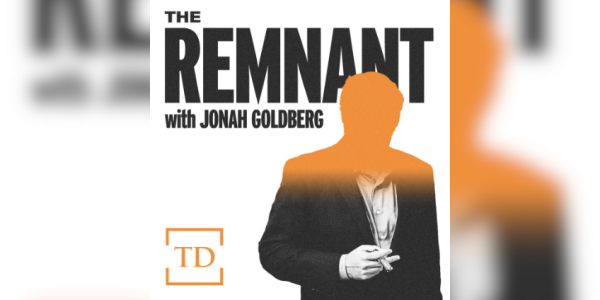Happy Tuesday! Kim Kardashian will pay a $1.26 million fine after reaching a settlement with the Securities and Exchange Commission for failing to disclose she had been paid to promote a cryptocurrency.
Is nothing pure? Surely Kim was encouraging her Instagram followers to buy EthereumMax tokens solely out of the goodness of her heart and passion for the underlying blockchain technology!
Quick Hits: Today’s Top Stories
-
Ukrainian troops continued to deliver sustained blows to Russian military positions throughout the country, seizing territory that Russians had controlled and leaving the aggressors stunned and bewildered. “What we are seeing is an excellent Ukrainian operational design playing out across the south and east of the country,” said Mick Ryan, a retired Australian general who has been offering regular assessments of the war on his Twitter feed.
-
The Daily Beast reported Monday that, in 2009, Herschel Walker—the former football star and Republican Senate candidate in Georgia—urged a woman with whom he conceived a child to get an abortion, which she subsequently did and for which he allegedly paid. Walker denied the allegation—dismissing it as a “flat-out lie” from a “Democrat activist disguised as a reporter”—and threatened to sue The Daily Beast for defamation. The denial led Walker’s son Christian—a 23-year-old conservative activist—to publicly accuse his father of lying about being a “moral, Christian, upright” man. “You’re not a ‘family man’ when you left us to bang a bunch of women, threatened to kill us, and had us move over 6 times in 6 months running from your violence,” the younger Walker tweeted. The National Republican Senatorial Committee is still standing behind Herschel Walker, with a spokesman for the campaign organization dismissing the charges as “nonsense from the Democrats and the media.” Walker is running a tight race against Georgia’s Democratic incumbent, Sen. Raphael Warnock, and control of the Senate could hinge on the race.
-
According to Japanese and South Korean officials, North Korea launched a ballistic missile over Japan this morning that landed in the Pacific Ocean about 3,200 kilometers east of Tokyo. Tuesday’s was the fifth such North Korean missile test this week, and the first to fly over Japan since 2017, causing Tokyo to issue alerts urging residents in the northeastern part of the country to take shelter.
-
U.S. Africa Command announced Monday that—in coordination with the Somalian government—U.S. forces conducted an airstrike in the Somali city of Jilib on Saturday killing a leader of the al-Shabaab terrorist group. The Somali government named the al-Shabaab official as Abdullahi Nadir, the group’s chief prosecutor and a potential future leader of the al-Qaeda spinoff. The U.S. claims no civilians were injured or killed in the strike.
-
New provisional data from the Centers for Disease Control released Friday found the suicide rate in the United States increased 4 percent in 2021 after two consecutive years of decline. Nearly 48,000 people in the U.S. killed themselves last year according to the report, and men between the ages of 15 and 24 saw the biggest year-over-year jump in suicides: 8 percent.
-
President Joe Biden announced Monday his administration—tapping into money included in last year’s bipartisan infrastructure bill—will devote $60 million to Puerto Rico to bolster the island’s hurricane preparedness, strengthening walls, raising levees, and upgrading communications systems. According to PowerOutage.us, nearly 110,000 Puerto Ricans remained without power as of Tuesday morning.
-
President Biden also re-upped his support on Monday for protesters in Iran, condemning the Tehran regime’s “intensifying violent crackdown” on students and children and vowing the United States will be “imposing further costs” this week to “continue holding Iranian officials accountable and supporting the rights of Iranians to protest freely.”
-
More than 130 people were killed at a soccer game in Indonesia over the weekend—and 320 injured—after police beat and tear-gassed fans who stormed the field, leading to a rush toward the exits in which dozens were trampled to death. Indonesian President Joko Widodo ordered the country’s professional soccer league to suspend all games until an investigation into security at the matches is completed.
Brazil’s Bolsonaro Not Done Yet

Brazilian President Jair Bolsonaro may not have taken the lead in the country’s presidential elections Sunday, but he’s the one who ended the night smiling.
The right-wing incumbent, a retired military officer, has been insisting for months that opinion polls showing him as many as 10 points behind his main rival—leftist and former president Luiz Inácio Lula da Silva, known as Lula—were wrong. And Bolsonaro was right. He finished Sunday with about 43 percent of the vote, short of Lula’s 48 percent but outperforming the polls and forcing a runoff on October 30. Lula’s still favored to win, but he’s no longer considered a shoo-in.
“By the grace of God, I have never lost an election and I know that it will not be now, when the freedom of all Brazil depends on us, that we will lose,” Bolsonaro wrote on Telegram Monday, according to a translation. “All the predictions were wrong and they are already the biggest losers of this election. We beat this lie and now we’re going to win the election!”
That “lying pollsters” rhetoric may have contributed to the polls being off. As we’ve seen in elections around the world, pollsters have struggled to accurately capture right-wing voters’ sentiments. Bolsonaro’s attacks on Brazilian pollsters’ reliability undoubtedly discouraged some of his supporters from answering their questions. Bolsonaro received good economic news shortly before the vote took place, with Brazil’s inflation rate dipping in August—from about 10 percent annually to about 8.7 percent.
Bolsonaro’s strong showing indicates that his initial election was not an aberration. “We thought that 2018 was an anomaly, it was an election that wouldn’t repeat itself because Bolsonaro was elected with an unknown party and basically doing a social media campaign,” Beatriz Rey, a senior researcher at the Center for Studies on the Brazilian Congress, told The Dispatch. “Now we understand that the extreme right is here to stay in Brazil.” And indeed, Bolsonaro allies won key congressional victories this weekend—supportive right-leaning parties now control half the lower chamber, and Bolsonaro’s party won 13 of 27 open seats in the Senate, with more victories possible in runoff votes. Those congressional gains will make it easier for him to push through his priorities if he’s reelected—or stymie Lula’s agenda if he’s not.
With the field cleared of other candidates, Bolsonaro and Lula may turn the next few weeks into a competition for Brazil’s centrists. Bolsonaro has pitched an increasingly free-market economy, while Lula—jailed on corruption charges but freed in 2019 over procedural errors—has promised a return to the commodities boom-fueled economic prosperity during his time in office. Both have promised to spend more on cash aid for poverty relief. Both are also generally friendly with the United States, but the Biden administration would likely have a closer relationship with Lula, since Bolsonaro has echoed former President Donald Trump’s baseless claims that voter fraud undermined the United States’ 2020 presidential election.
Bolsonaro also needs to appeal to Brazil’s women, who are skeptical of his support for gun access and dislike his history of racist and sexist comments. In one poll, just 29 percent of Brazilian women planned to vote for Bolsonaro, compared to 46 percent for Lula. Rey suggested the incumbent could use the power of the state in the coming weeks to improve his standing with these voters. Bolsonaro forced an expansion of cash benefits for the poor through Congress in July, and he’s reportedly weighing additional payments for female breadwinners.
The president has also divided Brazilians over his response to COVID-19—he downplayed the virus, delayed vaccine distribution, and made false claims about mitigation efforts. Protesters decried his response and federal police recommended he be charged with spreading fake information, while a congressional panel accused him of crimes against humanity for his move to let the virus spread unopposed in a push for herd immunity. More than 685,000 Brazilians have died of COVID-19, and around the height of the country’s outbreaks in 2021, 21 percent of Brazilians in one poll rated Bolsonaro’s COVID-19 response good or great, while 51 percent declared it bad or terrible.
Some international observers are worried Bolsonaro won’t accept a final defeat, as he’s been complaining about the possibility of voter fraud in Brazil’s elections for months. The situation has been compared to Trump’s attempts to overturn the 2020 presidential election. But some analysts believe even if Bolsonaro loses, Brazil’s swift vote counting and different political landscape could shield it from the fractious post-election environment in the U.S.
“Bolsonaro has no Grand Old Party behind him that’s willing to follow him to the brink and beyond,” Lauri Tähtinen, founder of geopolitical analysis firm Americas Outlook, said ahead of Sunday’s vote. “He does have the street to a certain extent, but not a consolidated political force in Congress.”
“These situations can be tricky,” Tähtinen added. “But there are dangers in using Brazil for some shadowboxing for the U.S. political scene.”
Worth Your Time
-
We promise to take a break from Jeb Bush content after this, but Adam Dalva’s Monday essay in The New Yorker is too good not to share. When the former governor of Florida was running for president in 2015, he told voters in New Hampshire they could email him with problems they thought he could help with. Dalva—who for four years had been trying and failing to complete a novel—took him up on the offer. “It’s looking like my first novel won’t be published. I’ve come as close as is possible to success without succeeding . . . how does one keep his head up in such a jarring failure?” Dalva continued writing into the void for years, using Bush’s email address as a diary of sorts—until Jeb wrote back. “You need to simply ask for help and give people an out. Jeb Bush,” Dalva recalls reading. “I staggered. My intimate journal, the repository of my deepest shames, had talked back to me.” The writer later interviewed Bush, drawing parallels between his own failures selling his novel to Bush’s failure to win the presidency. “You tried, and a lot of people don’t, and you should feel quiet comfort about that,” Bush told him. “‘And look, man, life goes on. It’s a journey, man. It didn’t happen,’ he said, seemingly pivoting back to his electoral failure without my prompting. ‘What am I supposed to do? Go in the fetal position and suck my thumb and hold on to my little blankie and say, ‘Woe is me?’”
-
Judge Laurence Silberman—who “horrified progressives by rescuing the Second Amendment from obscurity and confounded conservatives by upholding the Affordable Care Act”—has died at age 86. Paul Clement—former U.S. solicitor general and Silberman clerk—reflected on his former boss’ legacy in the Wall Street Journal. “Silberman was a national treasure, but to his former law clerks he was more,” Clement writes. “The year with the judge was a once-in-a-lifetime experience. It was an entirely oral clerkship. No bench memos were needed, but verbal sparring over the right answers was expected. He told war stories over lunch about everything from practicing law in Hawaii to dealing with Yugoslav dictator Josip Broz Tito. Being a Silberman clerk meant having a loyal mentor and trusted adviser for life. … It is a sad day. We have lost one of the great ones. But we have the enduring legacy of a happy warrior for judicial restraint, personal character and professional courage.”
-
The 2022 Nobel Prize in Literature will be announced Thursday, so it’s time for Alex Shephard’s annual tradition of offering freewheeling, secretly sincere, and notoriously incorrect predictions about the winner. “The Nobel is a lot like baseball: It’s increasingly irrelevant and overhyped, and it could probably use more—rather than less—corruption to make things more interesting,” Shephard writes in the New Republic. “For 121 years, the Nobel Prize for literature has sought to honor the best writing in the world, and for 121 years everyone has argued that it has managed to do no such thing. In the battle between the Swedish Academy and its most fearsome opponents, annoying people on Twitter (as well as Twitter antecedents, such as the newspaper column, the radio dispatch, and probably something involving a telegraph and/or a horse), neither party has scored a decisive victory. For every Sholokhov, there is a Canetti. For every Sully Prudhomme, a Toni Morrison. For every Winston Churchill, a … Rudyard Kipling? OK, wait, never mind.”
Presented Without Comment
Also Presented Without Comment
Also Also Presented Without Comment
Toeing the Company Line
-
On today’s episode of Advisory Opinions, David and Sarah preview what promises to be a spicy Supreme Court term—updated even since yesterday’s TMD with not one, but two Section 230 cases—along with a judge’s boycott of Yale law students, a tribute to Judge Silberman, and a roundup of Trump’s legal drama.
-
It’s Tuesday, which means Dispatch Live (🔒) returns tonight at 8 p.m. ET/5 p.m. PT! David, Adam, Declan, and Andrew will discuss Hurricane Ian and recovery efforts on the ground, the latest news out of the war in Ukraine, and what’s on the docket at the Supreme Court this term.
-
On the site today, Andrew Egger catches us up on Monday night’s Herschel Walker bombshell, Nick Catoggio examines the looming GOP civil war over Ukraine, Kevin D. Williamson argues claims of homophobia are a bad excuse for a bad film’s box-office failure, and Bill Wirtz says Turkey is trying to play both sides of the Russia-Ukraine war.
Let Us Know
When reading international news like the Bolsonaro story above, do you find your brain generally tries to map the various characters onto more familiar, U.S. politics?










Please note that we at The Dispatch hold ourselves, our work, and our commenters to a higher standard than other places on the internet. We welcome comments that foster genuine debate or discussion—including comments critical of us or our work—but responses that include ad hominem attacks on fellow Dispatch members or are intended to stoke fear and anger may be moderated.
You are currently using a limited time guest pass and do not have access to commenting. Consider subscribing to join the conversation.
With your membership, you only have the ability to comment on The Morning Dispatch articles. Consider upgrading to join the conversation everywhere.